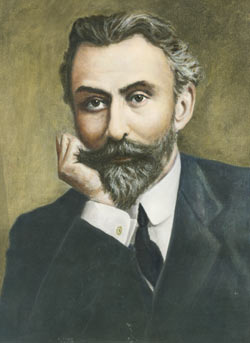Ratanji Tata
This article needs additional citations for verification. (October 2011) |
Sir Ratanji Tata | |
|---|---|
 | |
| Born | 20 January 1871 |
| Died | 5 September 1918 (aged 47) |
| Alma mater | University of Bombay |
| Spouse(s) | Navajbai Sett |
| Children | Naval Tata (adopted) |
| Parent(s) | Jamsetji and Hirabai |
| Relatives | Dorabji Tata (brother) Ratan Tata (grandson) |
Sir Ratanji Jamsetji Tata JP (20 January 1871, in Bombay – 5 September 1918, in St Ives, Cornwall) was an Indian financier and philanthropist.
Biography[edit | edit source]
He was the son of the noted Parsi merchant Jamsetji Tata. Ratan Tata was educated at St. Xavier's College in Bombay and afterwards entered his father's firm. On the death of the elder Tata in 1904, Ratan Tata and his brother Dorabji Tata inherited a very large fortune, much of which they devoted to philanthropic works of a practical nature and to the establishment of various industrial enterprises for developing the resources of India.
An Indian institute of scientific and medical research (Indian Institute of Science, IISc) was founded at Bangalore in 1905, and in 1912 the Tata Steel began work at Sakchi, in the Central Provinces, with marked success. The most important of the Tata enterprises, however, was the storing of the water power of the Western Ghats (1915), which provided Bombay with an enormous amount of electrical power, and hence vastly increased the productive capacity of its industries.
Sir Ratan Tata, who was knighted in 1916, did not confine his benefactions to India. In England, where he had a permanent residence at York House, Twickenham, he founded in 1912 the Ratan Tata department of social science and administration at the London School of Economics, and also established a Ratan Tata Fund at the University of London for studying the conditions of the poorer classes.
He was a great connoisseur of arts. The Chhatrapati Shivaji Maharaj Vastu Sangrahalaya (formerly Prince of Wales Museum) has a section displaying the collections of Sir Ratanji Tata (acquired in 1923) along with two other sections that of Sir Dorab Tata (acquired in 1933) and Sir Purushottam Mavji (acquired in 1915).[1]
Personal life[edit | edit source]

He married Navajbai Sett in 1893 and left for England in 1915. They adopted, Naval Tata from the family of a distant relative. He died on 5 September 1918 at St Ives in Cornwall, England and was buried at Brookwood Cemetery, Woking, near London, by the side of his father (Jamsetji Tata).[2]
Through an aunt, Jerbai Tata, who married a Bombay merchant, Dorabji Saklatvala, he was cousin of Shapurji Saklatvala who later became a Communist Member of the British Parliament.[3]
Legacy[edit | edit source]
After his death the Sir Ratan Tata Trust was founded in 1919, with a corpus of Rs. 8 million.[2]
Notes[edit | edit source]
This article includes a list of general references, but it remains largely unverified because it lacks sufficient corresponding inline citations. (February 2014) |
- ↑ "About Maharashtra". Maharashtra Tourism. Retrieved 11 April 2020.
- ↑ 2.0 2.1 "More than a businessman". Tata Group website. August 2008. Archived from the original on 8 November 2011.
- ↑ Oxford Dictionary of National Biography. Vol. 48. Oxford University Press. 1904. pp. 675–676. ISBN 0-19-861398-9.Article on Saklatvala by Mike Squires, who refers to Jamsetji as J.N. Tata.
References[edit | edit source]
External links[edit | edit source]
- 1871 births
- 1918 deaths
- Indian philanthropists
- Indian industrialists
- Knights Bachelor
- Indian knights
- Indian justices of the peace
- Tata family
- Parsi people from Mumbai
- Businesspeople from Mumbai
- St. Xavier's College, Mumbai alumni
- Indian art collectors
- Founders of Indian schools and colleges
- Burials at Brookwood Cemetery
